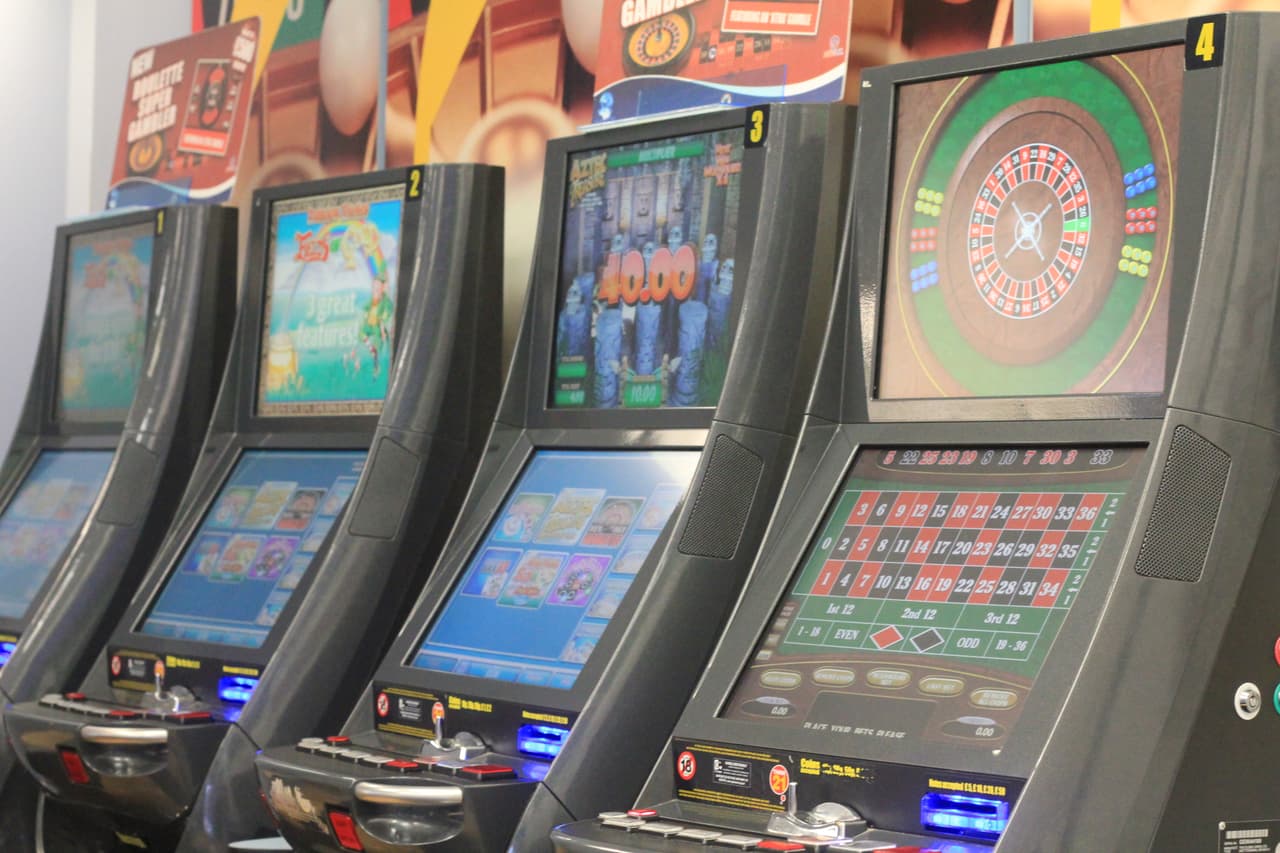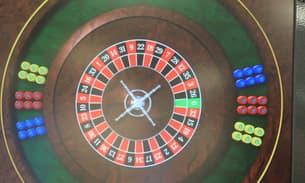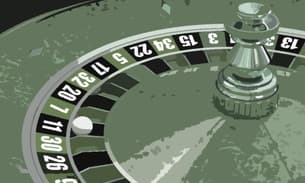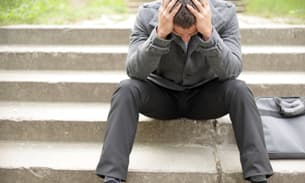
How Britain got addicted to bookies’ betting terminals
It’s 10am and already there’s a knot of men at the back of the betting shop. The strip-lit space is filled with the chatter of racing commentary, but the clients aren’t paying attention. Instead, they’re intently focused on a bank of tall touchscreen machines near the counter.
A man in his sixties in a tatty hat is playing poker games on two machines at once; to either side of him younger men play digital roulette. It’s been half an hour since anybody placed a sports bet, but each of the shop’s four gaming terminals is busy.
Mikheil isn’t having a good morning. He feeds in £20 and arranges his chips on the screen. He hits the Bet button, and watches an animation of a ball circling a roulette wheel, jittering into a slot with a clacking sound. No luck. He plays again. Within a couple of minutes he’s inserting another £20. The total in his electronic bank swells rapidly – at one point he’s up £170. He could cash it in. But he doesn’t, and it quickly vanishes.
By the time he leaves he’s lost £260, and it’s barely 11am. As a painter and decorator Mikheil earns £400 a week. But this week there’s no work, and he’s whiling away the mornings playing high-speed roulette.
‘It’s one of those things you do, and you know it’s not good, but you do it anyway,’ he says. ‘Even when you win and take your money, it’s not enough – you’ll just lose it again next time.’
The total in his electronic bank swells rapidly – at one point he’s up £170. He could cash it in. But he doesn’t, and it quickly vanishes. By the time he leaves he’s lost £260, and it’s barely 11am.
Outside the shop, someone has broken the glass in the bus stop. This is Green Lanes in Haringey, one of London’s poorest boroughs. The street, a cluttered and unlovely artery road, is filled with battered grocers and pawnbrokers; Mikheil is far from the only one drifting about looking for ways to fill the time. Almost the only big operators are the bookmakers – and they are here in force.
Within a half-mile stretch there are eight betting shops, including a cluster of four surrounding the post office. You can place a bet in more places than you can buy a newspaper; bookmakers outnumber banks by four to one.
All through the afternoon, the crowds in the bookmakers thicken; by 7pm they’re more popular than ever. They will stay open until 10pm.
And although the shops’ windows are plastered with football odds and their interior hums with racing commentary, for much of the day the gaming machines are the main attraction. Men – it is almost always men – charge in to play for 20 minutes, or linger for hours in a trance-like state.
When somebody wins, they make no fuss, but play again. When they lose, they might swear quietly or tut, and then play again.
‘The important thing is not to get greedy. You see people get greedy, and then when they lose, they get angry,’ cautions Mahir, a tiny man in his sixties, tapping his own screen with tobacco-stained fingers. He lost £10 earlier and is trying unsuccessfully to win it back. ‘I just play little amounts, to pass the time.’
Does he enjoy it? He looks blank and shrugs.
‘When I came here in 1998 or 1999, there were only one or two bookies,’ says Fasul, who is waiting for his cousin to finish on a roulette machine. ‘Now they are everywhere. The government should stop these machines: it’s a disease. With the horses, you put £5 on and you lose, it’s gone – so what? With the machines, it’s different.’
Fasul is right: with the machines, it’s different. If you think bookmakers make their money from racing and football, think again. Although online gambling has taken off in a big way, bricks-and-mortar bookmakers continue to thrive. These machines – formally called fixed-odds betting terminals – are the reason: they have transformed the industry, brought in new revenues, and in the process they have profoundly changed places like Green Lanes.
Souped-up fruit machines
Long gone are the fruit machines of old. In their place are souped-up betting machines offering high-speed, high-stakes casino games, where players can stake up to £100 on a 20-second spin of the wheel. Punters can play with cash, or pay with credit or debit cards at the counter.
This turbo-charged gambling is a niche occupation – fewer than 1 in 20 adults has used a fixed-odds betting terminal in the past year. But within this tiny group, they are phenomenally popular: based on financial statements from the biggest bookmakers’ accounts, the Bureau estimates that £123m a day is wagered on the UK’s 32,000 terminals. The bookmakers keep a tiny proportion of this, but it still adds up to £3.3m a day, or £1.2bn a year, according to the Gambling Commission.
Ironically, the gaming machines make bookmakers less dependent on chance: whereas a surprise sports result can affect a whole financial quarter, with fixed-odds betting terminals the returns are just that – fixed. The company keeps a long-term average of around 3% of the money staked on them.
For bookmakers it’s a winning strategy. The machines contributed 49% of William Hill’s high-street gains from bets last year – £424m. And each year bookmakers squeeze out more profits. William Hill’s latest figures show its 9,000 fixed-odds betting terminals earned an average of £900 a week – more than double the £402 per machine it earned in 2005.
Maximising these profits has meant changing how betting shops operate.
‘We have shops that open at 8am and don’t close until 10pm. This has nothing to do with football betting or horse racing – it’s just to keep the machines open and running as long as possible,’ said a spokesman for Community, the trade union for bookmakers’ staff.
Related story: Infographic – Wheel of Fortune

Regular free tournaments entice people to give the gaming machines a go, while staff are encouraged to bring punters free tea and coffee as they play.
Of course, bookmakers must also make sure there are enough machines to keep the punters playing. This is more complicated than it sounds.
When fixed-odds betting terminals appeared around the millennium, politicians spotted their similarity to ‘pokies’, the gambling machines that are massively popular in Australia. There, ‘pokie sheds’ can contain hundreds of machines, and the industry rakes in billions of dollars in tax for the government. But there is mounting opposition to this solitary form of gambling and last year prime minister Julia Gillard pieced together her coalition partly by promising curbs on pokies.
Keen to avoid pokie sheds in the UK, Richard Caborn, then the Labour gambling minister, agreed a voluntary cap of four machines per shop. This became law in the 2005 Gambling Act – but the Act also removed councils’ powers to prevent betting shops from opening. So in areas where the machines are in most demand the bookmakers simply open more branches.
A link to deprivation
The Gambling Prevalence Survey, a major study of British gambling, found the machines are most popular among young, male, low-income gamblers – particularly the unemployed – as well as students and those from ethnic minorities. This has led bookmakers to concentrate their high-street efforts on poor areas, where there are many such gamblers.
‘The expansion of betting shops is increasingly into areas which other retailers find difficult to make profitable because they are often targeting places which would have a DE demographic,’ said a retail analyst from Verdict Research. A ‘DE’ demographic includes manual workers, casual workers and the unemployed. ‘It seems gambling companies are able to make profits in these areas.’
In a way, betting shops are more akin to coffee shops than retailers: like a latte, having a flutter is a treat that doesn’t have to cost a couple of pounds. But it’s noticeable that there is no Starbucks, Costa or Caffe Nero on Green Lanes. Instead, there are two branches of Ladbrokes, two William Hills, a Betfred, a Coral, and two smaller outfits, Metrobet and Jennings Bet. Another Coral is a few metres away on a side street. By comparison, wealthy Hampstead High Street, a couple of miles to the west, has a solitary William Hill.
In March’s Budget, however, George Osborne announced plans for a 20% tax on the profits from fixed-odds terminals, replacing the flat-rate fee and VAT that had been payable before.
Peter Craske of the Association of British Bookmakers (ABB) said: ‘The number of betting shops has remained constant for the last 10 years at about 8,500. They are a key part of a local high street and play a key role in supporting a local economy.’ Although the ABB did tell a parliamentary select committee that the ‘geographic distribution [of betting shops] has been changing.’
This targetting of poor areas is what concerns Tottenham MP David Lammy, whose constituency includes Haringey. ‘The betting industry profits from poverty,’ he said, adding that Green Lanes’ betting shops ‘completely change the look and feel of the area.’
‘The clustering of betting shops is a local problem which calls for a local solution,’ says a parliamentary report, published today, that looked at the impact of the 2005 Gambling Act. The report recommends that councils should gain the powers to lift the limit of four machines per shop ‘if they believe that it will help to deal with the issue of clustering’ – yet it does not specify an upper limit on the number of machines that might be allowed.
Green Lanes’ eight bookmakers have 32 machines between them. If each is earning William Hill’s average of £900 a week, that’s almost £1.5m leaving the pockets of residents every year on this street alone. Yet Haringey is the fourth-poorest borough in London: one in five adults is on benefits, and almost 40% of children live in poverty.
Lammy’s concerns do not end there. He continues: ‘They attract small crowds of men that smoke and drink on the pavement outside, which can be an intimidating sight for many of my constituents. Other businesses on the high road suffer as they see their footfall reduced and prospective businesses look elsewhere to set up.’
Then there is the violence and petty crime. In Haringey, police were called to the borough’s betting shops an average of five times a week in 2010, the council reports. Betting shops are a ‘focus for crime and antisocial behaviour in areas where this was already known to be a problem’, the police told a council inquiry.
This is not a uniquely local problem. Community, the trade union, found there was a 150% rise in violent incidents in London’s betting shops between 2005 and 2011.
Gambling lobby
Betting-shop operators have long chafed against the ‘arbitrary’ limit of four machines per shop – and with the select committee’s recommendations to remove the cap, it appears the bookmakers’ lobby has scored a significant victory.
In March’s Budget, George Osborne announced plans for a 20% tax on the profits from fixed-odds terminals, replacing the flat-rate fee and VAT that had been payable before. This, campaigners argue, could be the stick the industry needs to finally persuade the government to increase the number of machines allowed in each shop. Already Peter Craske, of the Association of British Bookmakers (ABB), said the tax is ‘putting at risk over 2,600 shops and 11,000 jobs’.
The powerful gambling lobby has gained plenty of behind-the-scenes access to key decision-makers: Gala Coral, William Hill and the ABB have each treated gambling minister John Penrose to days at the races since the election. Meanwhile Steve Donoughue, a gambling lobbyist whose clients include William Hill, serves as secretary of the All-Party Parliamentary Group on Betting and Gaming, giving him direct access to interested MPs and peers.
And Donoughue has served as a paid adviser to the select committee inquiry, where industry bosses have used appearances to make their case for more machines per shop.
‘Ladbrokes does believe that when every internet-connected device – mobile, laptop or iPad – can be operated as a gaming machine, the arbitrary limit of four per shop is looking outdated. Machines in betting shops generate taxes, promote employment and provide an opportunity for people to enjoy their chosen pastime in a regulated, supervised environment,’ says Ciaran O’Brien, corporate affairs director at Ladbrokes.
William Hill’s commercial director David Steele told the select committee the increase wouldn’t have to be huge: ‘Five or six [machines per shop] would certainly satisfy demand at the high points of the day for the vast majority of shops in the UK.’
Problem gambling
But more machines may mean more money being extracted from poor communities such as Green Lanes. And many believe the gaming machines are a key factor in Britain’s rising rate of problem gambling.
The 2010 Gambling Prevalence Survey found the number of problem gamblers in the UK had risen to 451,000 – more than the population of Bristol, and an increase of 90,000 compared to three years before.
The same study found that 9% of those who had used fixed-odds betting terminals in the past year were problem gamblers – a higher rate than almost any other form of gambling.
From its modest top-floor premises in Soho, the NHS Problem Gambling Clinic has gathered a uniquely detailed set of data on the habits of chronic gamblers – including hundreds of users of fixed-odds betting terminals. People arriving at the clinic are asked which forms of gambling are most problematic: 51.4% named the machines.
Related story: Are fixed-odds betting terminals dangerously addictive?
But all the evidence is anecdotal, and Dr Henrietta Bowden-Jones, the Soho clinic’s director, is seeking funding for a much-needed focused study. She is finding these hard to come by.
The UK’s gambling industry made gross profits of £5.5bn in 2010/11 and commits to raising £5m to fund research, education and treatment – 0.001% of its profits.
The Responsible Gambling Trust distributes these funds. Its chief executive Marc Etches says: ‘There is no empirical evidence that gambling machines, including those found in licensed betting offices in Britain, cause people to become problem gamblers.’
In March’s Budget, however, George Osborne announced plans for a 20% tax on the profits from fixed-odds terminals, replacing the flat-rate fee and VAT that had been payable before.
Studying the machines will be ‘an important element’ of the trust’s work, he added – although the research on gaming machines the trust is currently funding does not include fixed-odds betting terminals.
Betting it all
For a tiny proportion of players, the machines can be devastating. David Armstrong, 65, from Norwich, had rarely been into a bookmakers until he was invited to join a digital roulette tournament in a branch of Coral. From a £100 dummy stake, he built up around £400.
‘I thought, that’s a lot of money – that’s a week’s wages,’ he said. ‘The next week, I went in and put a fiver on. And then another.’
While his partner worked nights at the local hospital, Armstrong started dropping into bookmakers. ‘Quick visits’ would last until closing time; sometimes he would bet £50 or even £100 on each spin.
In four years, he lost his garage business, his home, his long-term relationship and over £100,000 to the machines. He eventually had a breakdown – and he is still piecing his life back together.
‘You lose your sense of money when you’re on the machines: it means nothing. It’s so quick, you’re thinking just one more spin, just one more – until you walk out and you’ve lost it all,’ he adds.
Related story: Gambling – The secret addiction
Experts believe this speed of play – known as ‘event frequency’ – influences how addictive the machines are. Gambling counsellor Ron Turrell, of addiction charity Norcas, said: ‘Gamblers who move onto fixed-odds betting terminals seem to lose far more money than with the previous type of gambling. Because it’s a very fast game, it doesn’t give you much time to stop and think.’
You lose your sense of money when you’re on the machines: it means nothing. It’s so quick, you’re thinking just one more spin, just one more – until you walk out and you’ve lost it all.
David Armstrong
Anthony Jennens, chairman of gambling charity GamCare, pointed out the ‘realpolitik’ of the situation: fixed-odds betting terminals are so profitable that ‘it would possibly be a waste of time to focus too much attention on whether [they] are good or bad.’
A Department for Media, Culture and Sport spokesman said although the government is ‘aware of the general concerns’ around fixed-odds betting terminals, it has no plans to introduce new regulations.
Perhaps unsurprisingly, David Armstrong believes fixed-odds betting terminals should be banned. ‘They are machines of self-destruction,’ he said. ‘They’ve left me a destitute pensioner, and I’m still craving for them. How can you let a toy ruin your life? But when they’re emptying out the machines at the end of the day, it’s no toy any more.’




